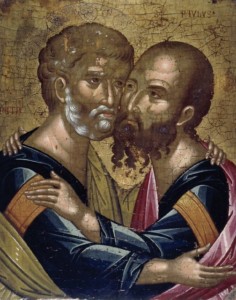Have you ever purchased a gift for someone—since it’s Mother’s Day, let’s say it’s for your mother—and you were so excited about it that you had to call her and say, “I’ve got your present, and I think you’re going to like it”? Or has someone ever said that to you?
When we know that a gift is on the way, and that the giver is really excited about it, don’t we look forward to the day when we will get to open the gift and celebrate with the person who made the gift? Doesn’t the wait grow somehow sweeter as it is prolonged, and doesn’t the rest of our life seem less important when we think about what we has been promised to us?
Our Lord is promising us an eternal gift, a dwelling place, a room prepared in the home of the Creator of the universe. This home will never be visited by death or mourning, sickness or fear. Do we take the time to desire this gift? How would our lives change if we thought about our eternal home more frequently, if we genuinely longed for heaven, and stored up spiritual treasure to adorn our dwelling? Wouldn’t the struggles of this life seem small, as Saint Paul has said?
“I consider the sufferings of this present time are not worth comparing with the glory to be revealed in us.”
Saint Paul was a man who lived in constant gratitude for the gift of life and sight that he had received from a merciful Jesus Christ. And this gratitude made him long for heaven. “My desire is to depart and be with Christ!” This desire strengthened Paul to endure all of his sufferings, to make light of them even. He kept his eyes fixed on the goal, on what had been promised to him.
It is significant that Paul is the Apostle to the Gentiles, and this brings out a second part of today’s gospel that I wish to share with you. There are many dwelling places in the Father’s house, so it is a gift being offered to many. In today’s first reading, we hear about a dispute that arose in the early church. It’s seems that the Greek-speaking widows were being neglected. They complained about this. Now Saint Benedict condemns complaining, but he also admits that it can be justified, and this is probably an instance of justified complaint. From our perspective, it is easy to be critical of this situation, but isn’t it just natural? The Apostles and their closest disciples at this point were all Jews, and it wasn’t necessarily ill-will or even prejudice that led to the neglect of the non-Jews in the group. There were probably problems in communication, language, customary behaviors that determined how to share needs with each other. Everyone had to be patient learning a new set of skills.
One of the ways in which Paul’s sight was restored allowed him to see that the death of Jesus saved not only the Chosen People from their sins. The death and resurrection is an offering for all peoples, even those far off. In baptism, our own eyes were opened to this reality, that we are members of a multitude that no one can number, made of every tribe, every single tribe and tongue. God’s grace—literally grace mean gift—is to anyone who would receive it. There are many, many dwelling places in the Father’s house. We have countless brothers and sisters, friends and comrades in heaven and still on earth.
Sometimes we struggle to accept this because accepting others and befriending persons with different customs, unfamiliar languages, and so on, poses a threat to our own ways of seeing the world, our own customs and liturgical language. In today’s world, a polemical multiculturalism tends to point fingers, separating us into categories of privileged and victim, and so it might helpful for me to state the same idea from the perspective, maybe the Greek perspective instead of the Hebrew perspective this time:
The communion of saints is waiting to accept you, your customs—purified of course—your language, all that is dear to you. The saints want to know you, want to welcome you.
You are a gift to the saints, and to God.
As Jesus says, as He prays to the Father at the end of the Last Supper, “Father, they are your gift to me.” You are that gift promised by the Father that Jesus has been longing to receive.
What strength there is in realizing this! How beautiful it is to feel this in our hearts, to celebrate this at our sacrifice today, to be called to the one altar of the Lord where are gathered mystically all the saints, our departed grandmothers and grandfathers, all those who are yet to be born whom God has chosen for us!
The Eucharist is a foretaste of the heavenly gift of eternal peace and joy—may our eyes be reopened to this reality today, and may our brothers and sisters who are still separated from our churches be consoled in the reality that their desire for heaven can be just as strong as they wait in longing to rejoin us at the Lord’s banquet.

